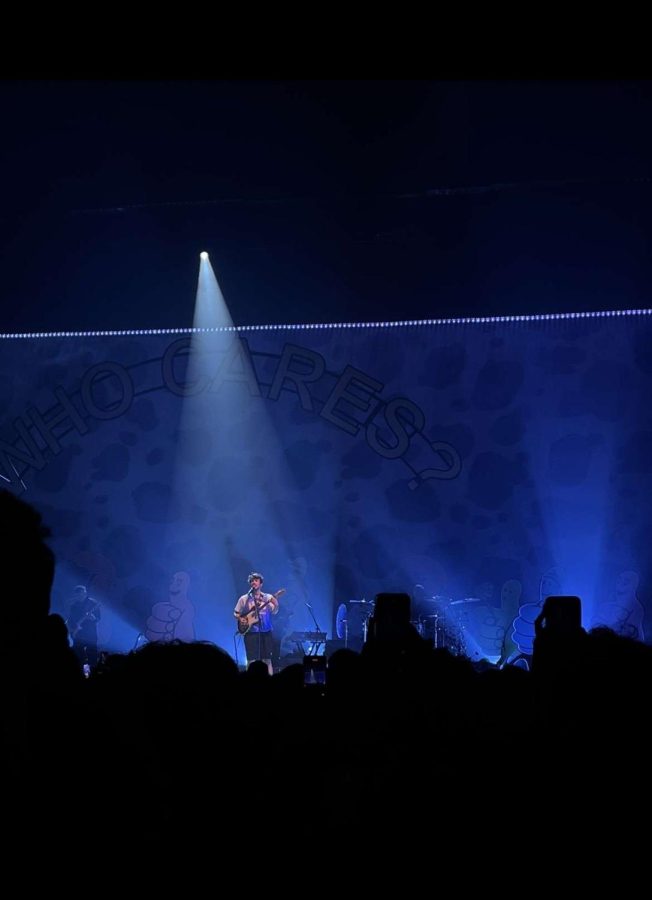Do Smaller Concert Venues Bring More Enjoyable Experiences?
View from a Rex Orange County concert
February 27, 2023
Over the past few decades, music has evolved into a mass of art filled with a multitude of creativity and exceptional talent that keeps listeners on their toes, awaiting new music. Yet as this musical mass has grown bigger beyond belief, so have the live action aspects of it. Artists plan months of a world tour to stop at the largest stadiums they can possibly find, putting on an extravagant show. Each concert takes hundreds of workers to coordinate sound, lighting, effects, background dancers, costume, makeup, and more. To the average human, witnessing this in-person is an out-of-body, overwhelming experience that they will remember for years to come; but is it growing to be too much? Are artists just trying to one-up each other in their efforts to be the biggest and brightest star?
Many have taken a step away from these huge shows, and looked at what the industry should really be rooted in- clear, raw, unfiltered music. There’s nothing wrong with larger than life concerts that leave the audience stunned, but sometimes all one needs is a guitar in hand and their own skilled talent. Despite his experience with smaller concert venues at shows like Ken Carson and Destroy Lonely being described as “cramped and hot,” Lakeville South student Omar Jallow actually prefers them to larger concerts because one “can actually see the artists up close,” rather than viewing them from a seat in the nosebleeds of a stadium that has to accommodate thousands of other people. Additionally, Junior Taylor Glinski’s array of concert experiences- such as Taylor Swift, Khalid, Rex Orange County, Claire Roskinkranz, and more- has led her to the similar conclusion that smaller venues, like Minneapolis’s own Fillmore and Armory theaters, bring a “better atmosphere.” Despite the big and bold “flames, screens, and lights” that make up a large show, she claims that a floor spot is more enjoyable than “sitting in a chair far away.”
The internet has shone a light on the intimate side of music as well, particularly NPR’s “Tiny Desk Concerts,” – live performances given at a small desk, with only the highlighted artist, instruments, a few band players, and a still audience. The series has gained a large following from people who enjoy listening to their favorite artist’s pure talent, and even the imperfections that may lie in their presentation. Included are their short intermissions between songs, where they interact with their crowd and prepare for the next track. Nothing about the transition is necessarily “smooth” in comparison to transitions at live shows. A costume change during a world tour is done magically in seconds, and the artist is on to their next song without skipping a beat, yet “Tiny Desk” emphasizes only the magic of music. These tiny cracks in their performance make it all the more personal for both fans and the artist in sharing love and appreciation for music and the skill that goes into making it.
Music is music, no matter where you are or how you listen to it, but there is something to say about the allure of intimacy that small concert venues bring. The artist and their talent become a tangible force placed right in front of you, without the divide of a screen or even of the hundreds of seated rows in between. The informality of these venues may make some anxious, especially with randomized general admission, but the informality is also what makes the experience more unique. It’s easier to interact with others who share the same musical interest, as they stand shoulder to shoulder with you in the mass of people standing just below the stage. There’s no other place you can experience this type of personal connection with not only your favorite musician, but also with strangers. As the music industry continues to grow in size, intensity, and extravagance, many shine a light of love on the artists who tour their way around smaller venues. Stripped of the spendy budget that A-list artists hold, they may not have much to “wow” the crowd with, but they have their raw, distinctive, and unbeatable talent- Isn’t that what music is all about?


